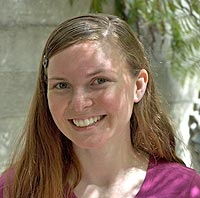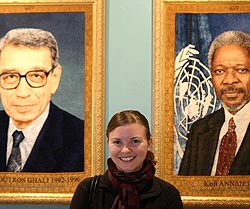 Pamila Pengra |
As a kid growing up in a liberal, middle-class family in Northern California, I was sure that I would go to college, maybe to grad school, and have some kind of settled career and family by age 25. But now, at nearly 27, I have only just finished my bachelor's degree.
It may have taken me longer than many of my classmates, but I am happy to have stumbled on a passion I hope to pursue for many more years - becoming thoroughly proficient in Arabic - as well as a life goal that I did not anticipate when I began college: human rights law.
After finishing high school and one year of junior college, I dropped out and moved to Los Angeles to be an actress. Admittedly, in the back of my mind I had always dreamed I would be discovered in the local malt shop or get my big break in our high school production of "Bye Bye Birdie." But the reason that I moved to L.A. was less about my desire to be an actress, and more about my inability to picture any kind of career for myself. It may sound strange, but moving to L.A., getting headshots, and finding an agent was actually the path of least resistance.
A year and a half later, after auditioning for parts like "Screaming Girl 1" and "Dancer #5" and never booking a role, I started looking into other careers. At a certain point I decided that I was going to try any job that would hire me, in the hopes that one would stick. So, I worked as a receptionist in a casting house, a health-food store cashier, a tour guide at an observatory, a professional swing dancer for corporate events, and an assistant to a high-powered talent agent. None of them felt quite right. Finally, I went back to school. I spent a few more semesters in community college, then transferred to UC Berkeley.
My experience at Cal has been amazing. I was lucky enough to find a tiny and intimate department - linguistics - where I could get to know many of my professors, as well as most of my classmates. At a large university that many complain is too impersonal, I found myself in such small classes that if I were to miss a day, 20 percent of the students would be missing. I also found that I was really good at linguistics, and everyone likes to do something that they are good at.
My interest in the Arabic language and the Middle East grew out of a project for one of my classes two years ago. Linguistics 110, Introduction to Phonetics and Phonology, requires students to examine a language that they have never studied before and classify the phonetic system. Luck and circumstance led me to choose Arabic, and perseverance kept me going. I took a summer intensive introductory course at Cal, then the year-long intermediate course, another summer intensive at Middlebury College (where you can't speak English during the course or you'll get expelled!), and finished this year with an Advanced Arabic class, an Arabic Literature class, and a graduate-level poetry seminar on the Palestinian poet Mahmoud Darweesh. I have now graduated, managing to pack four "academic" years of Arabic coursework into two calendar years.
I'm not really sure why I became so obsessed with Arabic: the language, the culture, the food. I have no Arab heritage; I'm a Euro-Mutt who can trace my American roots back to Civil War generals and plains-crossing pioneers. But as soon as I started learning Arabic, I couldn't stop - it's like an obsession, or falling in love. Have I been to the Middle East? No. Do I want to go? Passionately.
 For spring break in March, Pamila took a trip to New York, where she visited the headquarters of her dream job: the United Nations. (Photo by Dmitry Gudkov) |
I will be applying to law schools while I am abroad, and hope to start law school in the fall of 2006, focusing on international law. I know that actually living in the Middle East will give me a better understanding of an area that so few Westerners have gotten a chance to look inside, and I want to use that knowledge to work in human-rights law and mediation. My ultimate dream is to work for the United Nations, helping to draw up treaties and agreements that will help us all live more peacefully together.




